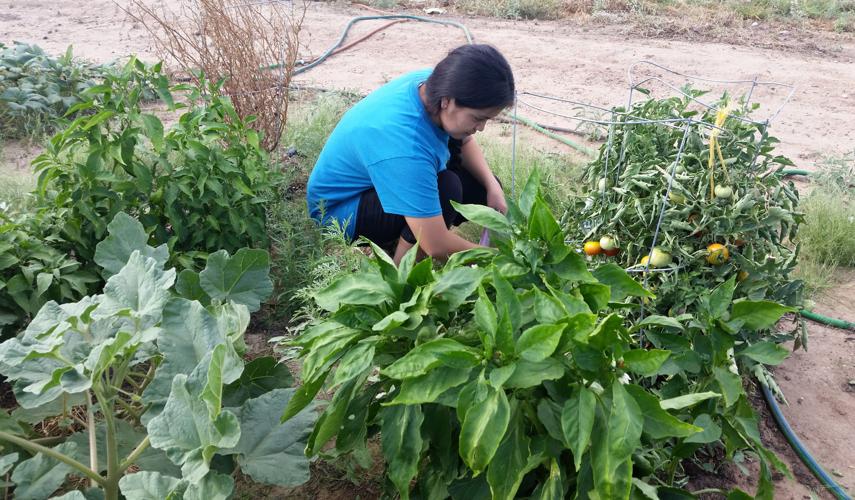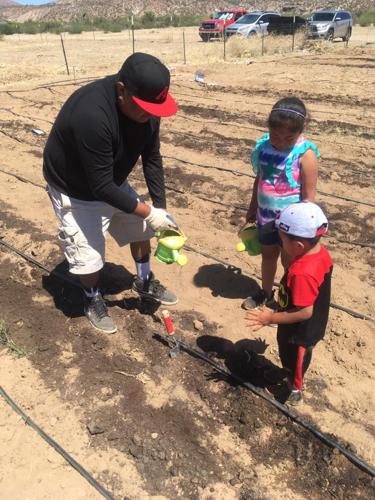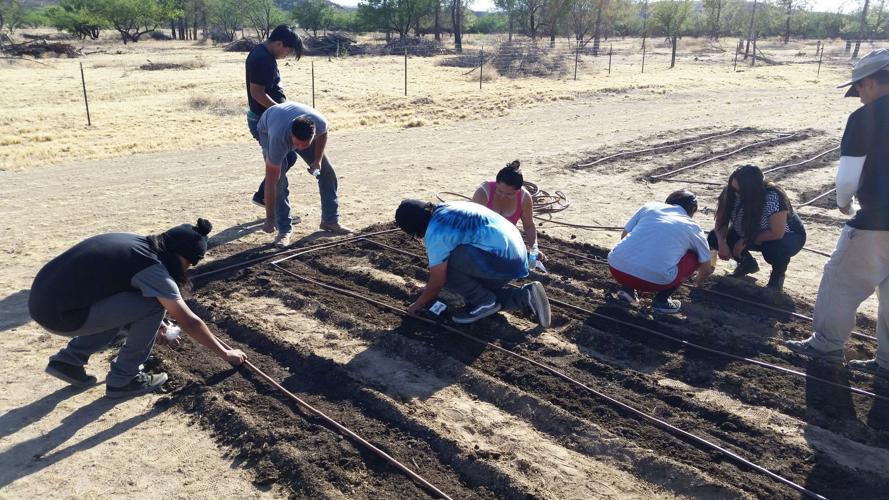About four years ago, an officer from the San Carlos Detention Center drove Bryce Barnes out to a defunct tree farm on the San Carlos Apache Reservation. The officer thought inmates might be able to grow trees again on the nearly 90 acres, but Barnes saw something more.
He envisioned a community farm where tribal members could reconnect with nature and their cultural roots. Such an endeavor could combat the reservationãs lack of access to fresh, healthy food options and direct the time and energy of the communityãs youth into something positive and educational.
Barnes has been working at the San Carlos Apache Reservation for the past eight years, mostly as an educator. Over the two years he spent teaching juveniles in the jail, he said he learned quite a bit about the culture, the people and some of their needs.
ãIt was when I was in the jail working with kids as young at 10 years old up to 17 years old that I just got a feel for some of the conditions the kids were dealing with and how they were just trying to survive,ã Barnes said. ãIt stirred my heart to do something.ã
People are also reading…
Barnes said in San Carlos, rehabilitation opportunities are limited, which is why many people end up in jail ã thereãs no other place they could go.
ãI really liked the idea of using gardening to help people learn life lessons, reconnect with nature, and take responsibility and care for something positive and life giving,ã Barnes said.

Community members from the San Carlos Apache Reservation working on the community garden on Nalwoodi Denzhone Community property. Crops are mostly corn, beans, squash, melons, sugarcane and peppers, which theyãll harvest in August. The current garden is one acre, but theyãre working to expand the garden to 10 acres.
Community collaboration
Barnes had already started a small garden at the detention center, in partnership with the UA Cooperative Extension, and it was not only producing food, but was well-received. With that base, Barnes helped start a nonprofit organization in 2014, called the Nalwoodi Denzhone Community, to enact his vision. Heãs president of the organization, which is situated on the tree farm, which is in the Dripping Springs area on the reservation east of Globe.
ãI saw it as an outdoor venue to revitalize and provide hope through education, life skills, gardening, animal husbandry, art, for those struggling to overcome addiction, crime, health issues and other obstacles,ã Barnes said.
However, the land lacked infrastructure.
Carrie Reede, community board member and tribal member, said while pots from the trees are still around, the original building had been damaged in a fire.
ãIt was really nothing ã the facility actually had burned down, it was a place where people in the community would go to party,ã Reede said.
Around the same time he started the nonprofit, Barnes heard about a group called Engineers Without Borders and contacted the University of ûÜêáøÝýË chapter.
The engineers group is a nonprofit organization that helps communities build infrastructure to improve their quality of life, both nationally and internationally.
Vicky Karanikola, the vice president of the Mountain Region Steering Committee for the engineersã group, has been involved with the nonprofit for 10 years, six of those with the UA chapter.
Karanikola said for the engineering group to work on a project, thereãs a vigorous application process focused on sustainability and community involvement ã the community has to be self-motivated.
ãThe San Carlos community ... knocked on our door and said ãhere, this is the vision we have for our community and this is the need,ãã Karanikola said. ãSo the first thing that we learn is this community is self-driven.ã
Domestically, the engineers work as consultants. Theyãve been doing assessment tests on the land, checking the capacity to have wells and overall water quality. Next, the engineers will deliver a plan that details the next steps to take to get an agricultural well up and running for the farm.
ãWeãre figuring out is there enough water, is the water quality good enough, with the amount of water they have, what kind of plants can they irrigate, what crops do the community want, what is the best way to irrigate those crops,ã Karanikola said.
Tackling food desert
Barnes said they want to grow corn, beans, squash, melons, sugarcane and peppers, all from seeds from the Native Seed group. Theyãve already started, with a small, 1-acre garden, but to fulfill the communityãs vision, Nalwoodi Denzhone needs to expand.
Once the agriculture well is running, they can plant 10 acres and fill a need in the community, Barnes said.
ãThereãs not a lot of fresh produce in the area,ã he said. ãThe tribe isnãt farming fruits and vegetables; they mostly do cotton and alfalfa and thereãs only one grocery store out here for the whole reservation, and it doesnãt have a lot of fresh fruit and vegetables. Thereãs also a lot of health issues related to nutrition, like diabetes.ã
Nalwoodi Denzhone Community hopes to teach the community not only how to garden on the organizationãs property, but how to start their own gardens on their land, as it used to be, according to Reede.
ãYou hear the older generation in San Carlos saying, ãOh, there used to be apple trees, corn fields and all this,ã and you see it in the archive pictures, but thatãs definitely gone out the window now with our people,ã Reede said. ãWe have stores that itãs quicker to go to. (But) thereãs a lot of good things we want to do with those crops.ã
Part of that starts with the children. Nalwoodi Denzhone Community holds summer camps and many other youth-focused activities.
ãI say, ãOK kids, you guys go to the store with your family and you guys get an orange or an apple, fruit of any kind, just know that the fruit doesnãt come for Bashasã,ãã Reede said. ãThe seed that you guys are holding in your hand, this is where it comes from. So the hard work that youãre doing right now and the good prayers that youãre laying down for that little seed to grow, this is where is all starts.ã
Barnes said his nonprofit works to bring organizations together and bridge gaps in relationships between departments.
Right now, the Nalwoodi Denzhone Community is partnered with not only Engineers Without Borders, but the University of ûÜêáøÝýË Cooperative Extension, the U.S. Department of Agriculture, Gila County, the San Carlos health department, the tribal council and many tribal departments.
ãThere are lots of individual efforts here but thereãs a need to make a big difference,ã Barnes said. ãWe have to come together and work together for a project like this.ã
Reede, who has not gardened before joining Barnesã nonprofit, said she hoped more people will take part.
ãThe impact itãs had on me ã I hope it makes a huge impact on individuals in my community,ã Reede said. ãI think bringing back hard work and patience. Itãs definitely healing. Itãs rewarding. I canãt wait to take a first bite of our tomatoes.ã
Marissa Heffernan is a University of ûÜêáøÝýË journalism student who is apprenticing at the Star. Reach her at metro@tucson.com
















